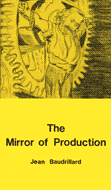This is the second of two blog posts by Frederick H. Pitts that reassess the importance and impact of Jean Baudrillard’s The Mirror of Production. Read the first post here. Where the first post dealt with Baudrillard’s criticism of the productivism of political economy and its Marxist critique, the second deals with the implications of Baudrillard’s critical analysis for any radical alternative to production.
 In the first post, we explored Baudrillard’s critique of productivism. The attributing of some kind of essential humanity to labor is identified by Baudrillard as one of the most pernicious effects of the productivism in political economy, Marx included. Indeed, humanism itself can be seen as the “product” of political economy (Baudrillard, 22). Taking over the “phantasm” of “labor as the human essence” from political economy, Baudrillard suggests Marx projected this understanding upon the working class as “their central means of self-comprehension.” Rather than maintaining a narrow fixation on the condition of one’s exploitation as labor as the means by which this exploitation can be transcended, Baudrillard argues that workers must liberate themselves from the status of “labor-power,” and “think themselves under another sign than that of production” (Poster, 3).
In the first post, we explored Baudrillard’s critique of productivism. The attributing of some kind of essential humanity to labor is identified by Baudrillard as one of the most pernicious effects of the productivism in political economy, Marx included. Indeed, humanism itself can be seen as the “product” of political economy (Baudrillard, 22). Taking over the “phantasm” of “labor as the human essence” from political economy, Baudrillard suggests Marx projected this understanding upon the working class as “their central means of self-comprehension.” Rather than maintaining a narrow fixation on the condition of one’s exploitation as labor as the means by which this exploitation can be transcended, Baudrillard argues that workers must liberate themselves from the status of “labor-power,” and “think themselves under another sign than that of production” (Poster, 3).


